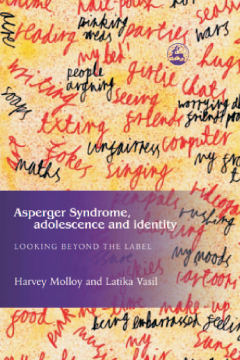
Additional Information
Book Details
Abstract
How do teenagers with Asperger Syndrome view themselves and their own lives?
This book is based on extensive interviews with adolescents diagnosed with AS. It includes six life stories, written in collaboration with the teenagers themselves. These present an authentic and fascinating look at the lives of the teenagers and how AS has shaped their growing identities. The stories provide the basis for a discussion of common themes and issues facing teenagers with AS. Asperger Syndrome, Adolescence, and Identity also questions the medicalized deficit approach to Asperger Syndrome and discusses the social repercussions of labeling teenagers as having AS.
This is a welcome addition to the growing library about Asperger Syndrome. Compared with most books, this takes a slightly different approach to the subject by using a narrative approach and more specifically a combination of life stories as told by five teenagers and one almost teenager plus some additional life history material contributed by their parents. The authors used a guided (but not structured) interview technique that combined freedom with the coverage of certain specific areas that they wanted to highlight. Books like this are so useful to parents, teachers, and, of course, those who have AS. Knowing how other people cope, how positive they can be and what heights of achievement they scale is a tremendously valuable contribution, this is a very worthwhile addition to the literature on the subject.
Metapsychology
Harvey Molloy is a researcher and writer residing in New Zealand. Prior to this he was an Assistant Professor in the Scholars' Programme at the National University of Singapore. Latika Vasil has a doctorate in educational psychology and is a researcher and writer, also based in New Zealand, with an interest in Asperger Syndrome. Both are involved with various autism and AS organisations.
I found the stories compelling. So many of them reminded me of my own son and others I know. The reader is led to understand his parents frustration within the constraints of mainstream schooling. The most important thread I found from all the stories is that the label Asperger syndrome is useful for others in identifying a social difference between them and their peers, but they are still al individuals.
Children Now
Table of Contents
| Section Title | Page | Action | Price |
|---|---|---|---|
| About the authors | |||
| Acknowledgments | |||
| Abbreviations and acronyms | |||
| Stepping Stones with Children Book 1 | |||
| Introduction | |||
| Session 1: Getting started | |||
| Session 2: Using our brains | |||
| Session 3: Gender and sex | |||
| Session 4: Child rights and sexual and reproductive rights | |||
| Session 5: The tree of life | |||
| Session 6: How to be assertive | |||
| Session 7: All about virtues | |||
| Session 8: The power of love | |||
| Session 9: Bringing out the best in each other | |||
| Session 10: Coping with loss and the tree of love | |||
| Session 11: Understanding death and coping with our feelings | |||
| Session 12: All about HIV | |||
| Session 13: Testing for HIV and talking about it | |||
| Session 14: Living well with HIV | |||
| Session 15: Partners in health care | |||
| Stepping Stones with Children Book 2 | |||
| Session 16: Friendship | |||
| Session 17: Going to school | |||
| Session 18: Managing alcohol and other drugs | |||
| Session 19: When we are growing up | |||
| Session 20: Relationships, love and sex | |||
| Session 21: Our sexual feelings and sexual safety | |||
| Session 22: Pornography | |||
| Session 23: Delaying, starting, and stopping having sex | |||
| Session 24: All about condoms | |||
| Session 25: Children by choice not chance | |||
| Session 26: Protecting each other from sexual abuse | |||
| Session 27: Supporting survivors of sexual abuse | |||
| Session 28: Learning and contributing | |||
| Session 29: Livelihoods |
